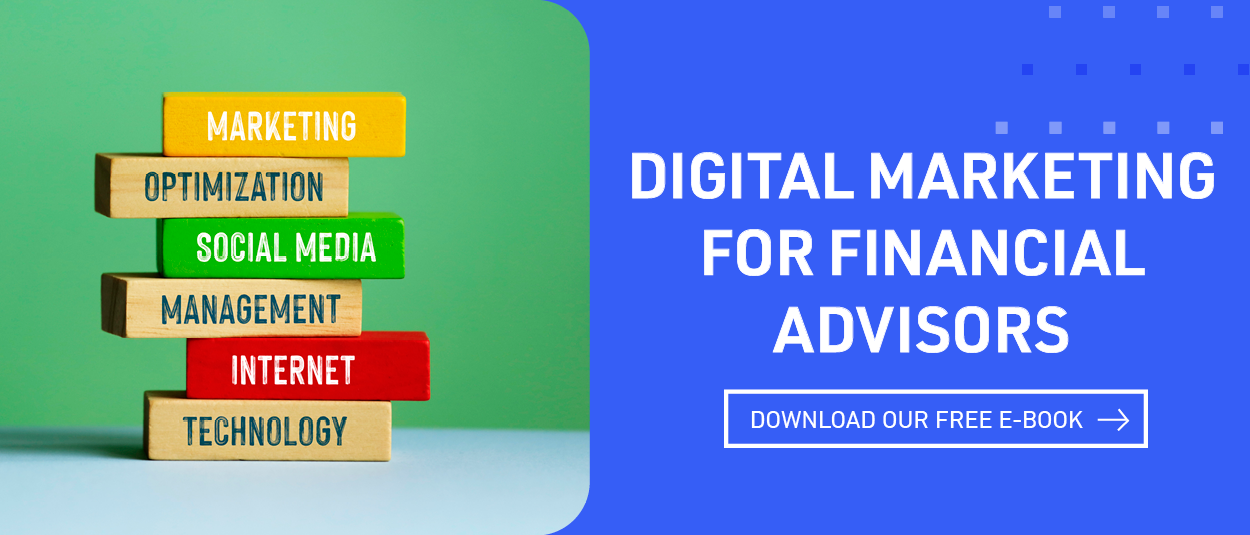Why Do Financial Advisors Need Digital Marketing In 2023?
We can answer this question in five words: The impact of the internet. Millions of investors, per Google, are already using the web for three reasons:
- Finding financial advisors in their communities.
- Learning more about the advisors.
- Initiating contact with the financial advisors who make their shortlists.
Then they conduct two or three interviews until they are ready to make their final selection decisions.
What do you notice about this selection process that differs from how the marketing process worked in the past? If you are like most financial advisors, it is the amount of control over the process that investors are exercising.
In 2023, more advisors are relying on digital marketing strategies to participate in the web-based process used by increasing numbers of investors.
The Demise of Outbound Marketing
Not long ago, advisors dominated the selection processes that investors used. They were in control because investors had to talk to them to learn more about them.
Outbound Marketing tactics included cold calling, direct mail, networking, and referrals. Financial advisors used different combinations of these sales tactics to reach and initiate contact with individual investors they could convert into revenue-producing clients.
How receptive were the advisors to these tactics, particularly cold calling? Rumor has it thousands of financial advisors burned out "dialing for dollars" and left the industry. Another rumor, back in the day, said the turnover rate for new advisors was around 70%.
These invasive sales tactics were tough on advisors and prospective clients. Only the most aggressive salespeople flourished in this environment because the high rejection rates did not impact them. The same could not be said for high-quality financial advisors who relied on their planning and investment knowledge to win over their target audience.
In fact, many of them did not view sales as a good use of their time. They would rather spend time producing financial plans and managing their client's assets.
So what changed? Technology and the web are big reasons why these tactics stopped working. For example, Caller ID made cold calling less and less productive, so it was no longer an effective sales strategy.
Spam filters made email marketing more difficult. Furthermore, the CRM service providers implemented strict rules for email solicitations.
What Was The Catalyst for The Rise of Inbound Marketing?
You have seen how the internet has impacted the marketing practices of other industries. It would be naive to believe it would not have a similar impact on the financial service industry. In fact, the financial service industry is a perfect application for the world wide web because it exchanges information between buyers and sellers.
The popularity of the internet has also shifted the balance of power from financial advisors to investors. Investors no longer had to talk to advisors to learn more about them and their firms. Today, they merely have to visit the advisor's websites (82% do that) and Google search their names (64% do that) to learn more about potential advisors and their firms before they contact them.
One more source of power exists when investors use online tactics to find, research, and contact financial advisors. They are anonymous until they are ready to schedule introductory interviews with prospective advisors.
Not only does digital marketing for financial advisors have to create visibility and deliver the right information for advisors, but what it delivers has to be competitive with information from other competing advisors.
Do Financial Advisors Still Need Sales Skills?
If investors search online to find, research, and contact potential advisors, do financial advisors still need marketing skills to convince investors to buy their advice and services? Or, is it more important to deliver the information investors seek on the web and schedule interviews to answer any additional questions they may have?
The process is more about delivering the right information and less about aggressive sales skills.
The more advisors focus on digital marketing, the less they will need strong sales skills to convince investors to buy. In fact, there are five primary questions that most investors will be asking financial advisors:
- Are you an expert in your field?
- Can I trust you to provide advice that is in my best interests?
- Do you provide the services I am seeking?
- Do you work with investors like me?
- What characteristics differentiate you from other advisors?
All of this information can be easily researched and provided online with the right content marketing.
So what is left? Are you the type of financial advisor I would like to work with? This can create the need for face-to-face or virtual meetings. Websites, blog posts, a strong social media presence, and eBooks can deliver any other information.
This is the subjective part of many investors' selection processes. All too often, investors select the financial advisors they like the best. There can be a certain amount of selling to be viewed as that person.
What is the most effective marketing strategy that financial advisors can use to add new clients?
The more investors utilize Google and other search engines to find, research contact, and select advisors, the more important digital marketing will be for visibility and delivering the information investors seek online.
There is also another way to think about financial advisor marketing. To be blunt, there is no sales opportunity if advisors do not have competitive marketing online. That's because the traffic online represents the top of their sales funnels.
There is no sales opportunity if investors can't find financial advisors online. And, there is no sales opportunity if investors don't like what they find while researching on the web.
The three key metrics for digital marketing are online visibility, website traffic, and website conversion rates. These metrics measure the effectiveness of digital financial advisor marketing strategies.
Conclusion
The web has created a profound shift in power from financial advisors to investors who use their services. Digital marketing is the way to make sure this shift in power benefits you. Working with a digital marketing agency can help connect you with your ideal clients and grow your business. Contact us today to see how we can help.


